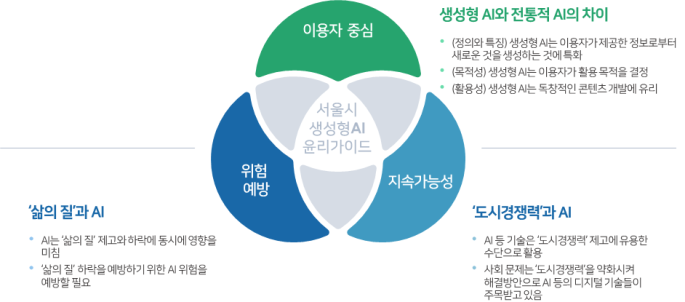– Announcement of ethics guidelines, one of the three major projects for daily life of AI for Seoul citizens
– Deriving 3 key requirements according to generative AI risk types based on 9 basic principles
– Foundation “We will take the lead in sound use of AI through citizen education and the spread of ethical culture.”
※ Preemptive use for citizen safety against AI risks behind the spread of AI (fake news, personal information infringement, etc.)

□ On October 26, the Seoul Digital Foundation (Chairman Kang Je-sik) announced the Seoul City Generative AI Ethics Guidelines, one of the three major projects to make artificial intelligence (AI) a daily life for Seoul citizens.
○ The Seoul Metropolitan Government's generative AI ethics guidelines were prepared as part of an effort to continue the government's policy of enacting a digital bill of rights and establishing ethics guidelines for each field.
□ This ethical guideline is characterized by research based on the characteristics of generative AI and the core values of Seoul City, and includes ethical compliance matters that operators and developers must adhere to, focusing on users.
○ The purpose of these ethics guidelines is not to take a regulatory approach to private companies, but to present norms that users, operators, and developers can voluntarily comply with so that they can safely utilize generative AI.
□ By collecting opinions from various experts in industry, academia, and research several times, we derived the direction and three basic principles for the ethical guidelines, and presented nine key requirements based on this.
□ The ethical guidelines selected ‘user-centeredness, risk prevention, and sustainability’ as the three basic principles.
○ The ‘Basic Principles’ were derived based on the characteristics of generative AI (actively generating results according to user intention) and Seoul City’s core values (‘quality of life’, ‘urban competitiveness’).
○ ‘User-centered’ means that new risk factors appear depending on the level of user participation in generative AI, so it is necessary to establish ethical guidelines centered on ‘users’.
○ ‘Risk prevention’ means that in order to improve the quality of life, it is necessary to minimize risks as much as the use of AI, so key requirements must be derived based on the risks of generative AI.
○ ‘Sustainability’ refers to the need to solve urban problems such as crime and environmental pollution that weaken urban competitiveness through generative AI, and for this purpose, the concept of sustainability is needed in ethical guidelines.
□ The ethics guidelines are based on three basic principles: ‘user verification capacity, responsibility, data rights and responsibilities, securing usability, AI learning data safety, AI ethics knowledge, publicness, ecological sustainability, and security’. It was presented as a key requirement.
○ In order to derive key requirements, we researched and analyzed literature and published data presenting the risks of generative AI at home and abroad, and classified the types according to the similarity of risks.
○ In addition, we analyzed actual cases by type to derive issues that can be considered by each stakeholder and analyzed how they are interpreted by existing ethical principles. Based on the analysis results, we derived key requirements that stakeholders must comply with.
□ In addition, the background and precautions along with risk types and actual cases for each core requirement that stakeholders (users, operators, developers) need to know in order to comply with the core requirements of the ethical guidelines are presented in the 'Guidelines'.
○ In order for ethical guidelines to be actively spread and utilized, it is necessary to accurately recognize the types of risks faced by stakeholders and the compliance requirements appropriate to them.
□ Seoul Digital Foundation Chairman Kang Je-sik said, “As generative AI is spreading, concerns about AI risks such as fake news and personal information infringement are also increasing. Accordingly, for the safety of citizens, the foundation has preemptively announced the first generative AI ethics guidelines of a local government,” he said. “Through this, we hope that citizens will use AI safely and conveniently, and our foundation will also provide citizen education, “We will strive to create a culture of sound AI use through activities to spread ethical culture,” he said.



